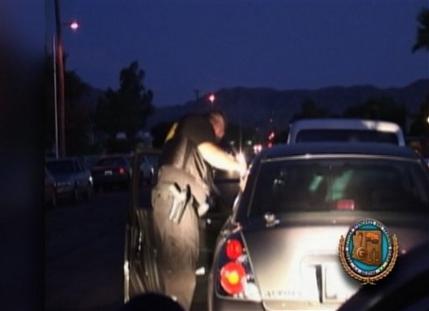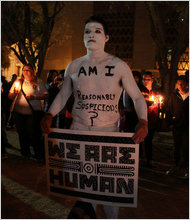PHOENIX Arizona police officials warned officers not to use race or ethnicity when enforcing the state’s new immigration law, saying that the country is watching their every move.In a new training video released Thursday, the officials said opponents of the law may secretly videotape officers making traffic stops, trying to ensnare them and prove that they’re racially profiling Hispanics.”Without a doubt, we’re going to be accused of racial profiling no matter what we do on this,” Tucson Police Chief Roberto Villasenor tells officers on the video from Arizona’s police licensing board. The video is designed to teach officers how to determine when they can ask a person for proof they’re in the country legally.Officers can consider that someone doesn’t speak English well, is wearing several layers of clothing in a hot climate or is hanging out in an area where illegal immigrants are known to look for work, according to the video.
They can take into account that a person doesn’t have identification, tried to run away, is traveling in an overcrowded vehicle, or seems out of place and unfamiliar with the area.But the stakes for making a mistake are high: Officers can be fired if they start asking questions because of a person’s race, then lie about it later, the video warns.”It is also clear that the actions of Arizona officers will never come under this level of scrutiny again,” said Lyle Mann, executive director of the training agency. “Each and every one of you will now carry the reputation for the entire Arizona law enforcement community with you every day.
“Arizona’s law, sparked by anger over a surging population of illegal immigrants in the border state, generally requires officers enforcing another law to question a person’s immigration status if there’s a reasonable suspicion that the person is in the country illegally.Officers are told that the law applies only to a stop, detention or arrest – not when a person flags down an officer. Police are not required to ask crime victims or witnesses about their status, and anyone who shows a valid Arizona driver’s license is presumed to be in the country legally.The law restricts the use of race, color or national origin as the basis for triggering immigration questions.
But civil rights groups and some police officials argue that officers will still assume that illegal immigrants look Hispanic.Arizona’s 460,000 illegal immigrants are almost all Hispanic. Yet Arizona also has nearly 2 million Hispanics who are U.S. citizens or legal residents, about 30 percent of the state’s population.In the training video, an expert advises officers to ask themselves whether they’d reach the same conclusion about a Hispanic person’s immigration status if the subject were white or black.”If any officer goes into a situation with a previous mindset that one race or one ethnicity is not equal to another’s, then they have no business being a law enforcement officer in this state,” Arizona Police Association president Brian Livingston says in the video.
The video and supporting paperwork will be sent to all 170 Arizona police agencies.Police bosses will decide the best way to teach their forces. There is no requirement that all 15,000 Arizona police officers complete the training before the law takes effect July 29.Gov. Jan Brewer ordered the Arizona Peace Officer Standards and Training Board to develop the training when she signed the law April 23.Opponents have challenged the measure as unconstitutional and have asked that a federal court block it from taking effect. U.S. District Judge Susan Bolton plans to hear arguments on the request later this month.
President Barack Obama on Thursday called the law an understandable byproduct of public frustration with the government’s inability to tighten the system, but also said it is ill-conceived, divisive and would put undue pressure on local authorities.
The law was passed in part with the lobbying muscle of unions representing rank-and-file police officers who argued that they should be allowed to arrest illegal immigrants they come across.It was opposed by police bosses who worried it would be expensive to implement and would destroy the trust they’ve developed in Hispanic neighborhoods. (AP)






